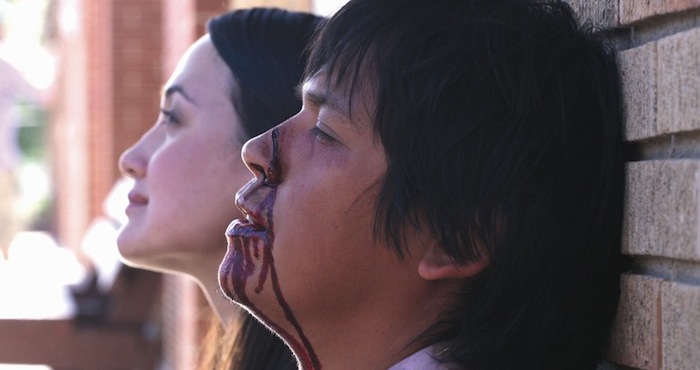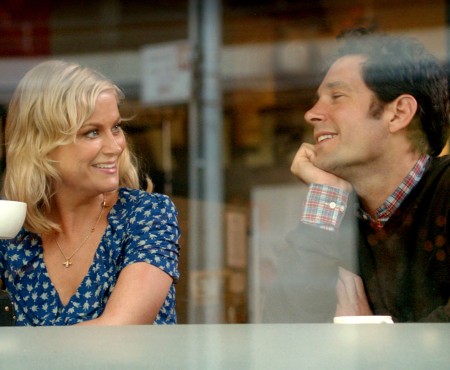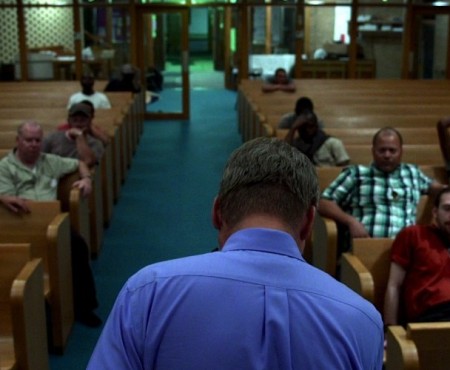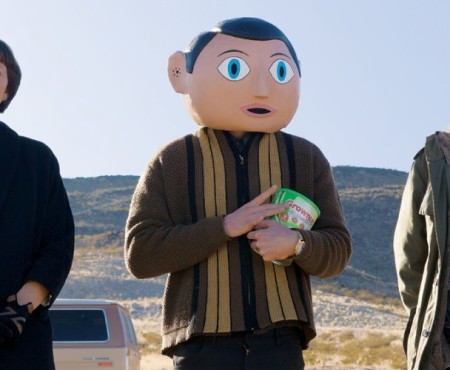James Welch’s 1974 novel Winter in the Blood is a quietly important piece of work, one of the earliest voices to emerge in modern Native American literature. Now, sibling directors Alex and Andrew Smith, unheard from since their 2002 debut feature The Slaughter Rule, have brought the book to life on screen. The result is a befuddling, meandering, and difficult film, and a good number of audience members are liable to not jibe with it. That’s their loss.
Virgil First Raise (Chaske Spencer) spends his days drinking and laying about his family’s ranch on a Montana reservation. One morning, he awakens hungover in a ditch to see a vision of his dead father. He goes home and discovers that his wife has left him, and taken his beloved rifle with her. Ignoring the concerns of his mother, stepfather, and grandmother, he sets out to find his gun. Over the next few days, Virgil collides between fights with his family and neighbors, memories of his childhood, visits with a solitary blind man, and encounters with a strange out-of-towner called “Airplane Man” (David Morse) who may or may not be a figment of his imagination.
Like a lot of Native fiction, Winter in the Blood is concerned with identity. Virgil is haunted by a terrible past, the same way that a long list of atrocities linger in the collective memory of Indians. He’s nigh paralyzed by his shitty life circumstances and the trauma he’s endured, and he tries to smother it under alcohol, sex, and general lethargy. The meaning of the title is quite evident. The answer the story suggests to thawing such a stasis (and this can apply no matter who you are) is to face one’s past, and not try to bury it.
The journey to self-discovery, though, is windabout and full of dead ends. There are no pointless diversions in this story – every character and event seems to drip with double meaning – but on the surface, many scenes seem opaque and confusing. The film is deliberately deliberate, in no hurry to get anywhere. The sense of purpose driving the plot is loose at best, since that purpose is being pursued by a man in a perpetual mental haze. The film is getting the viewer to feel this haze, which can be absorbing or alienating, depending on what one is willing to engage with.
This is one of the movies that feels like a puzzle. Everything means something, and it’s up to you to figure out what it is. Just as one example: Agnes, Virgil’s wife (Julia Jones), is beautiful save her horrifically rotten teeth. That’s not difficult symbolism to unravel, especially once more of Agnes’s personality is revealed through her actions. But it’s just one piece among many.
To me, the movie doesn’t feel like a chore or a challenge. It’s headiness is alleviated by a wonderful sense of humor. Morse’s character only makes easy sense half the time he’s on screen, but his bizarre con man ebullience is delightful to behold. The interactions between Virgil and his family are also endearingly goofy.
Spencer is liable to surprise anyone who only knows him from the Twilight series. There’s a long line of pitiful screwup protagonists in indie film, and he joins the best of those ranks. He carries an awful weariness in his eyes, and walks like a fugue is stringing his limbs. Virgil is a numb character (he has winter in the blood, after all), and Spencer is beautifully nuanced in his portrayal.
Winter in the Blood is weird. It’s sometimes boring, often on purpose. The Montana vistas are beautiful without being beautiful, feeling rough and inhospitable despite their visual majesty. It’s the nowhere land of a roughshod Indian reservation brought to life. It’s a hypnotically strange film that uses its long stretches of quiet to make its peaks of emotion all the more potent. It comfortably nestles into the canon of Native cinema, and it’s a worthy adaptation of the book. I say this without having read the book, because I think the only measure of whether an adaptation is good or not is whether it’s good on its own. And it is good.





















One thought on “LAFF Review: ‘Winter in the Blood’”
Thank you for this. Truly.